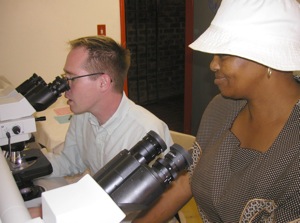-
- DA’s Office: Sheriff’s department not criminally liable in transgender death
- New organization will balance psychological claims made by anti-gay right
- Councilmember Atkins leads meeting to counter crime in District 3
- Bill to let HIV-positive men use reproduction techniques passes Senate Health Committee
- Community News
-
- Twenty-seven arrested at ACT UP 20th anniversary demo
- Funeral picketing bill goes to Kansas governor
- Group says it may try to put gay foster ban on ballot
- MySpace prank had John McCain favoring same-sex marriage – for an hour
- Richardson touts record in trying to break out in campaign
- National News Briefs
- World News Briefs
san diego
Bill to let HIV-positive men use reproduction techniques passes Senate Health Committee
California and Delaware only states that bar medical procedure
Published Thursday, 05-Apr-2007 in issue 1006
In 1989, California began restricting men with HIV from donating sperm, blood or tissue. The reason was to curb the spread of the deadly virus.
But in recent years, the law has had an unintended effect. It prevents men who are HIV-positive from taking advantage of reproductive medical services – treatment that would ensure the lowest risk of spreading the virus to a female partner and/or potential offspring.
State Sen. Carole Migden, D-San Francisco, has introduced legislation that would allow HIV-positive men to utilize these reproductive services. Before a couple could try artificial insemination or in vitro fertilization, the semen would first be treated to minimize the chance of transmitting HIV with a medical procedure known as “sperm washing.” The procedure allows semen to be cleansed of HIV or other infections, dramatically reducing if not eliminating the risk of transmission.
Migden said current law discriminates against HIV-positive men because it restricts men with HIV from donating sperm, blood or tissue. The new legislation, Senate Bill 443, which passed its first legislative hurdle last week with a 7-2 vote in the Senate Health Committee, would also “ensure equal reproductive rights for women” regardless of their partner’s HIV status.
Meanwhile, many California couples legally forbidden from using advanced reproductive technology continue to risk transmitting HIV while attempting to conceive.
One HIV-positive man who lives in the San Diego area said he and his wife have risked trying to conceive on their own to no avail. Their last hope, he said, is in vitro fertilization, but California law has prohibited them from trying.
“We’ve considered adoption, but still we’d like to have a child of our own. Because my wife cannot get pregnant without reproductive assistance, we have no choice but to use in vitro,” said Jason Dirk, a 38-year-old mortgage officer. “It’s unfair that they can’t use my sperm to impregnate my wife, even though there are methods to do so, only because I have HIV.”
The number of people the bill would affect is relatively small. Cost is a huge impediment. According to Migden, the price of in vitro fertilization – a procedure in which the sperm and egg are fertilized in a lab dish and the embryo is then implanted in the woman’s uterus – costs about $15,000. Artificial insemination, a much less elaborate fertility treatment, costs several hundred dollars.
California and Delaware, according to Migden, are the only two states where couples that include an HIV-positive male cannot take advantage of assisted reproduction services, a technology that has been in use in for 10 years elsewhere. Many of those couples try to conceive instead through intercourse, increasing the risk of infecting the woman and, potentially, the child.
A 2003 study by the American College of Obstetricians and Gynecologists found that couples determined to start a family will ultimately attempt conception on their own, exposing the woman to an estimated 10 percent chance of being infected with HIV and consequently putting the child at risk as well.
The 4,000 reported cases outside California in which couples with an HIV-positive man have used reproductive assistance haven’t turned up a single instance of transmission to the female partner.
“[Such] studies show the risk of transmitting the virus from an infected man to uninfected female through intercourse depends on the amount of virus in the blood stream,” said Dr. Davey Smith, the assistant professor of medicine in the division of infectious diseases at University of California, San Diego.
Researchers have found that risk generally ranges from one in 1,000 to one in 8,000 per act of intercourse, but those odds multiply the longer it takes to conceive.
“By contrast, while there is still a theoretical risk, the 4,000 reported cases outside California in which couples with an HIV-positive man have used reproductive assistance haven’t turned up a single instance of transmission to the female partner,” said Smith, a research virologist whose primary focus is on the transmission of HIV, including characterizing HIV shed from the genital tract.
There has been some debate in the medical community about the ethics of helping a couple with an HIV-positive partner have a child. But those concerns have subsided as treatment of HIV has improved. People infected with the virus who receive the most up-to-date treatment can live for decades.
“Life spans for patients with HIV are getting longer and longer, and people are realizing they can have families. When the law was imposed 18 years ago, the technology that exists today was not available, but there are reproductive specialists already assisting in these procedures in the state,” Smith said.
Smith admitted he has assisted in the sperm washing process himself.
“The research that I do has helped to figure out how much virus is in the ejaculate. So, because I do research in this area, I usually get about four requests a year to assist in such procedures.”
He said in the past year he has helped two married couples and one non-married couple to conceive in this way.
“There is not anyone here in town that really performs the procedure, but they do it in Long Beach, Los Angeles and Irvine. There are also many specialists in Arizona who do the procedure.”
Smith noted, however, the procedure needs to be a collaboration between the patients and their own HIV doctor, along with a reproduction specialist.
“When the man is HIV-positive, it’s a great option for people to have children.”
It is an option Migden hopes will help to make dreams come true for couples like Dirk and his wife.
“All families deserve access to the tools that reproductive science has to offer,” Migden said. “In this case, California law needs to catch up with technology because, whether inadvertent or not, it discriminates against HIV-positive men. My legislation will ensure equal reproductive rights for all women, regardless of their partners’ HIV status.”
The existing law prohibits the transfer of any tissues into the body of another person by means of transplantation, unless the donor of the tissues has been screened and found non-reactive for infection with HIV, viral hepatitis and syphilis.
|
|
Copyright © 2003-2025 Uptown Publications



